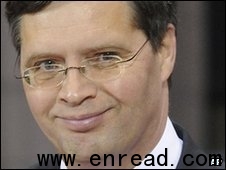| ||||||||||||||||||||||||||||||||||||||||||||||||||||||||||||||||||||||||||||||||||||||||||||||||||||||||||||||||||||||||||||||||||||||||||||||||||||||||||||||||||||||||
|
An inquiry1 into the Netherlands' support for the invasion of Iraq says it was not justified2 by UN resolutions. 一个调查荷兰对入侵伊拉克支持情况的调查团称,根据联合国决议,这是不公平的。  Jan-Peter Balkenende lent political support to the Iraq war The Dutch Committee of Inquiry on Iraq said UN Security Council resolutions did not "constitute组成,构成 a mandate命令,授权 for... intervention4 in 2003". The inquiry was launched after foreign ministry5 memos7 were leaked that cast doubt on the legal basis for the war. The Netherlands gave political support to the 2003 invasion of Iraq, but had no military role. The report demolishes推翻,破坏 the Dutch case for supporting the invasion, says the BBC's Europe correspondent Jonny Dymond. It could also be taken to reinforce the international case against the Iraq war, he says. The report accuses ministers of a selective use of intelligence reports, and says Prime Minister Jan-Peter Balkenende "gave little or no leadership to debates over the Iraq question", which was steered绕过,躲过 by the foreign minister at the time, Jaap de Hoop10 Scheffer. Mr Balkenende formally thanked the committee for its report, but said he needed time to study it before responding. Mr Balkenende decided12 to join the "coalition13 of the willing" assembled by US President George W Bush because, he said, Saddam Hussein had consistently坚实地,一致地 flouted14嘲笑,蔑视 UN resolutions and possessed15 weapons of mass destruction大规模杀伤性武器. The Dutch parliament opposed the decision to back the invasion. Committee chairman, Willibrord Davids, said the Netherlands' loyalty to its alliance with the US and UK had taken precedence over优先于,地位高于 the need to ensure the legality of the invasion. The committee said there had been no UN mandate3 for the attack, putting the decision to join at odds16 with争执,不和 international law. It said "the wording of [UN Security Council] Resolution 1441 cannot reasonably be interpreted as authorising individual member states to use military force". Iraq's alleged17 breach18 of Resolution 1441, which gave Iraq "a final opportunity to comply with its disarmament裁军 obligations", was used by the coalition, and the Netherlands, to justify19 its invasion. However, a memo6 from the time by Dutch foreign ministry lawyers, subsequently leaked, suggested the war was in fact illegal under international law. The inquiry said there was no evidence to support rumours20 that the Dutch military took part in the invasion. While the government has always said its military was not involved, questions had been raised because Dutch troops were taking part in exercises nearby at the time. Dutch forces became part of the stabilisation稳定 force that was deployed21 to Iraq in the years after the war. The Dutch parliament is likely now to consider whether the prime minister misled误导 parliament, and whether to launch a formal parliamentary inquiry. 点击  收听单词发音 收听单词发音
|
||||||||||||||||||||||||||||||||||||||||||||||||||||||||||||||||||||||||||||||||||||||||||||||||||||||||||||||||||||||||||||||||||||||||||||||||||||||||||||||||||||||||
上一篇:日本某酒吧发生致命枪击事件 下一篇:土耳其要求以色列就外交纠纷事件致歉 |
||||||||||||||||||||||||||||||||||||||||||||||||||||||||||||||||||||||||||||||||||||||||||||||||||||||||||||||||||||||||||||||||||||||||||||||||||||||||||||||||||||||||
- 发表评论
-
- 最新评论 进入详细评论页>>



